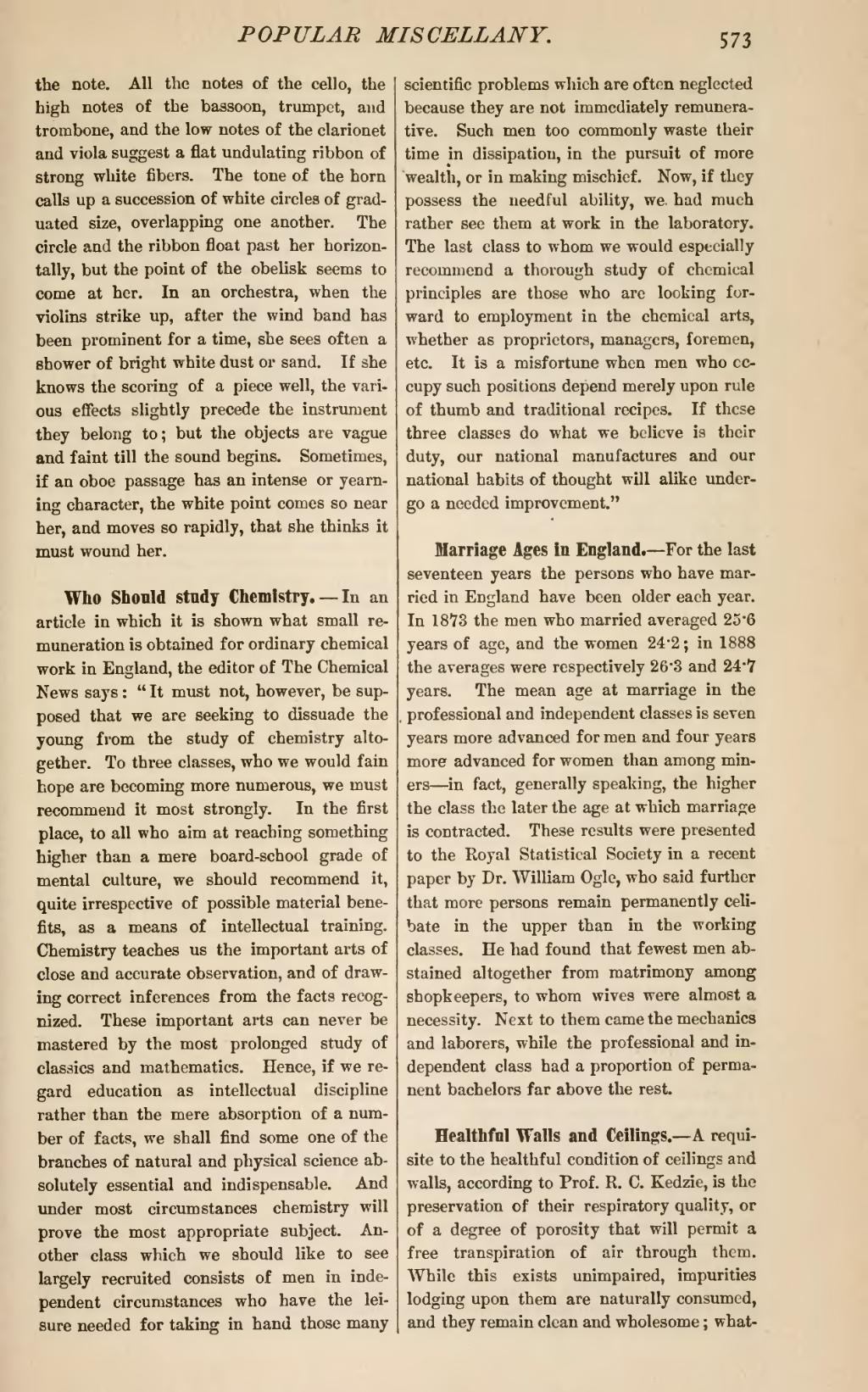the note. All the notes of the cello, the high notes of the bassoon, trumpet, and trombone, and the low notes of the clarionet and viola suggest a flat undulating ribbon of strong white fibers. The tone of the horn calls up a succession of white circles of graduated size, overlapping one another. The circle and the ribbon float past her horizontally, but the point of the obelisk seems to come at her. In an orchestra, when the violins strike up, after the wind band has been prominent for a time, she sees often a shower of bright white dust or sand. If she knows the scoring of a piece well, the various effects slightly precede the instrument they belong to; but the objects are vague and faint till the sound begins. Sometimes, if an oboe passage has an intense or yearning character, the white point comes so near her, and moves so rapidly, that she thinks it must wound her.
Who Should study Chemistry.—In an article in which it is shown what small remuneration is obtained for ordinary chemical work in England, the editor of The Chemical News says: "It must not, however, be supposed that we are seeking to dissuade the young from the study of chemistry altogether. To three classes, who we would fain hope are becoming more numerous, we must recommend it most strongly. In the first place, to all who aim at reaching something higher than a mere board-school grade of mental culture, we should recommend it, quite irrespective of possible material benefits, as a means of intellectual training. Chemistry teaches us the important arts of close and accurate observation, and of drawing correct inferences from the facts recognized. These important arts can never be mastered by the most prolonged study of classics and mathematics. Hence, if we regard education as intellectual discipline rather than the mere absorption of a number of facts, we shall find some one of the branches of natural and physical science absolutely essential and indispensable. And under most circumstances chemistry will prove the most appropriate subject. Another class which we should like to see largely recruited consists of men in independent circumstances who have the leisure needed for taking in hand those many scientific problems which are often neglected because they are not immediately remunerative. Such men too commonly waste their time in dissipation, in the pursuit of more wealth, or in making mischief. Now, if they possess the needful ability, we. had much rather see them at work in the laboratory. The last class to whom we would especially recommend a thorough study of chemical principles are those who are looking forward to employment in the chemical arts, whether as proprietors, managers, foremen, etc. It is a misfortune when men who occupy such positions depend merely upon rule of thumb and traditional recipes. If these three classes do what we believe is their duty, our national manufactures and our national habits of thought will alike undergo a needed improvement."
Marriage Ages in England.—For the last seventeen years the persons who have married in England have been older each year. In 1873 the men who married averaged 25·6 years of age, and the women 24·2; in 1888 the averages were respectively 26·3 and 24·7 years. The mean age at marriage in the professional and independent classes is seven years more advanced for men and four years more advanced for women than among miners—in fact, generally speaking, the higher the class the later the age at which marriage is contracted. These results were presented to the Royal Statistical Society in a recent paper by Dr. William Ogle, who said further that more persons remain permanently celibate in the upper than in the working classes. He had found that fewest men abstained altogether from matrimony among shopkeepers, to whom wives were almost a necessity. Next to them came the mechanics and laborers, while the professional and independent class had a proportion of permanent bachelors far above the rest.
Healthful Walls and Ceilings.—A requisite to the healthful condition of ceilings and walls, according to Prof. R. C. Kedzie, is the preservation of their respiratory quality, or of a degree of porosity that will permit a free transpiration of air through them. While this exists unimpaired, impurities lodging upon them are naturally consumed, and they remain clean and wholesome; what-

